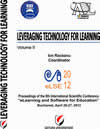MLMS – ENABLING SCORM COMPATIBLE LEARNING MANAGEMENT SYSTEMS
MLMS – ENABLING SCORM COMPATIBLE LEARNING MANAGEMENT SYSTEMS
Author(s): Aurelian Jurcoane, Anatol Oprea, Dragos CazacuSubject(s): Education
Published by: Carol I National Defence University Publishing House
Keywords: SCORM; mobile; LMS; cloud; eLearning
Summary/Abstract: Starting with ‘iFever’, during the last five years, mobile devices became the next big step in the ITC industry with the next five anticipating their becoming the “de facto” Internet access devices. eLearning must migrate as well, in order to maintain its main purpose: delivering information and empowering knowledge acquisition. The mobile enabled Learning Management Systems must be a hybrid one, capable of delivering content and record user progress in various contexts both classical and mobile. Although the main focus in present times has been on how content should be designed for mobile delivery, the same question should be asked for Learning Management Systems, as well, how they should be designed to enable delivery of such mobile content. This paper analyses what are the main challenges for designing such an mLMS are, and how they can obey both the quite old requirements like the SCORM standard as well as the mobile devices characteristics such as discontinuous access to the LMS (due to Internet access limitations) within a session or between sessions, content faceting (adding mobile support for existing content), feedback from and synchronisation of multiple access points (mobile or desktop) in achieving learning goals and objectives by using cloud enabled architectures. We are addressing issues concerning content compatibility validation for mobile devices, aggregation of mobile content with analogous content, enhancement of existing content and how an mLMS should be storing asynchronous submission of learner progress data as well as synchronicity between desktop clients and mobile clients. The last concern involves analysing device delivery mechanisms, custom LMS clients for mobiles and capabilities that could be implemented by such clients in order to overcome the inherent limitations of a browser-only web application delivery system for mobile devices. Last but not least we address issues concerning accessibility of content, a feature often overlooked by mobile content in general.
Journal: Conference proceedings of »eLearning and Software for Education« (eLSE)
- Issue Year: 8/2012
- Issue No: 02
- Page Range: 80-85
- Page Count: 6
- Language: English

